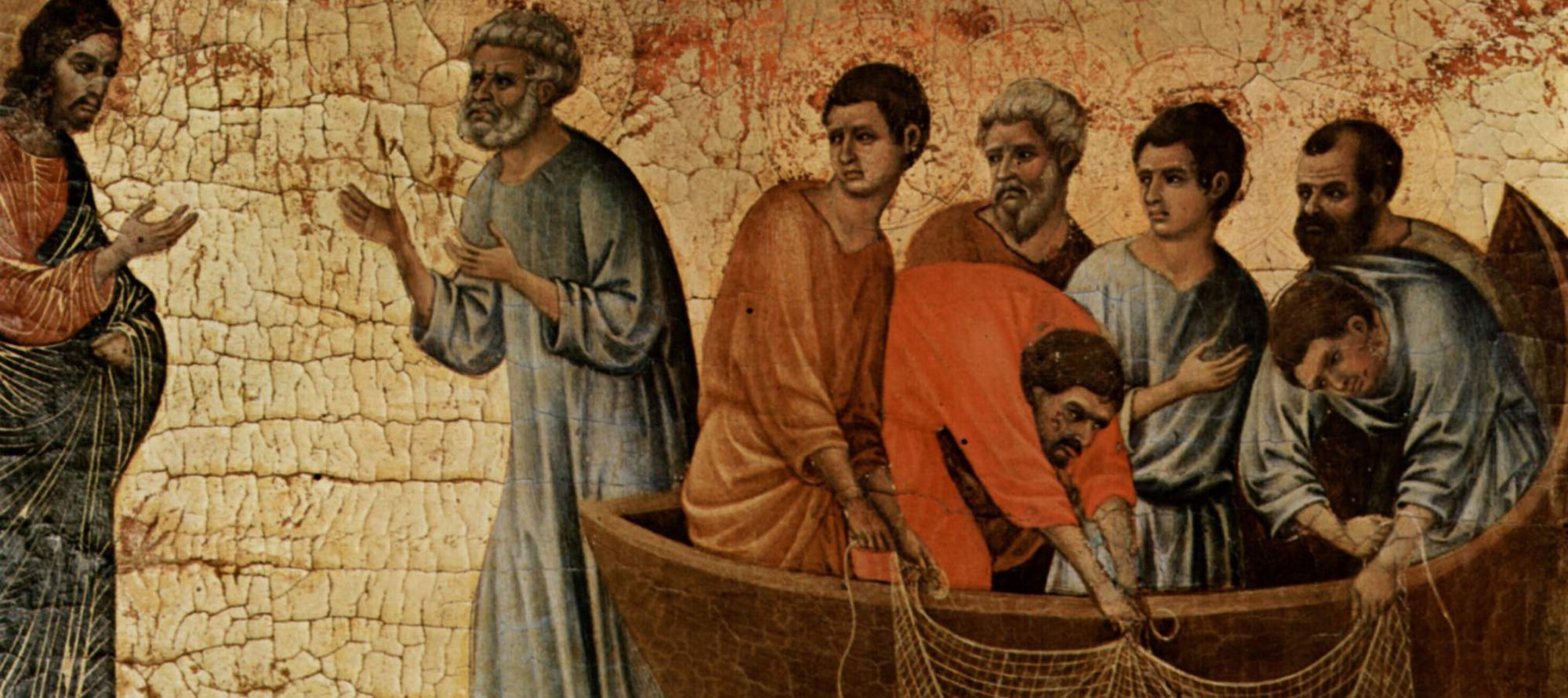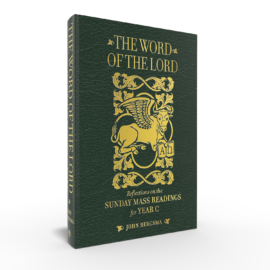
The Gospel reading for the Third Sunday of Easter, John 21, highlights the primacy of Peter among the Apostles.
Peter is listed first among the disciples named as present. The other disciples follow his lead by accompanying him fishing. When Jesus shows his presence on the shore, Peter is the first one to go ashore, followed by the others. The others don’t seem to be able to get the fish ashore. But then, the way John describes it, it sounds like Peter goes single-handedly back on board the boat and drags in the net of 153 fish by himself. After the breakfast, Peter alone is granted a private audience with the risen Lord. Obviously the author of this Gospel has a high regard for Peter and his role among the Apostles and within the Church.
But this Gospel is not only about the primacy of Peter. It is also about the primacy of love. During the “audience” between Jesus and Peter (vv. 15–19), Peter’s ritual re-confirmation as chief shepherd all revolves around his love for the Lord.
First, Jesus asks Peter, “Do you love me more than these?” (v. 15). The question is ambiguous. Who are the “these”? Does Jesus mean:
(1) “Do you love me more than [you love] these [other men]?” In other words, Do you love me above all other persons in your life?
(2) “Do you love me more than these [fish]?” In other words, Do you love me more than your profession, your way of life, your livelihood, your “comfort zone”?
(3) “Do you love me more than these [other men do]?” In other words, Do you have greater love for me than others do? Do you excel in love so as to be suitable to excel also in authority?
Ambiguity abounds in the Gospel of John, and I think it is intentional. All three interpretations may well be meant. Jesus is eliciting from Peter a comprehensive love to correspond to the comprehensive role of shepherding that he will bestow.
Three times Jesus asks about Peter’s love; three times Peter affirms it. Two different words for “love” are used in the Greek. The first two times, Jesus asks Peter, “Do you agapē me?” Agapē is the word for “divine love.” Peter always answers, “I phileō you.” Phileō is the Greek word for “fraternal love.” The last time, Jesus adopts Peter’s term and asks, “Do you phileō me?”
This gives the impression that Jesus asks twice, “Do you love me with divine love?” And Peter responds twice, “I love you with brotherly love.” And at last Jesus condescends to Peter’s capabilities: “Do you love me with brotherly love?” thus implying that such love will suffice: Jesus will accept what Peter, no longer brash and now painfully cognizant of his human weakness, knows he can offer. This interpretation is suggestive, but it must be entertained with caution because both phileō and agapaō are used elsewhere in John for both divine and human love.
The idea that Jesus is condescending to Peter’s human weakness is, nonetheless, clear from the passage as a whole. Otherwise, Jesus would have rejected Peter on account of his threefold denial at the Lord’s time of need.
The primary requirement that Jesus asks of Peter is love. In return for this love, Jesus commissions Peter to “Feed my lambs— tend my sheep—feed my sheep.” The threefold repetition of this commission, together with the variations in which Jesus phrases the shepherding charge, point to the comprehensive nature of the shepherding role Jesus is giving to Peter. While all the Apostles have a role as shepherd over part of the flock, Peter is commissioned as shepherd of the whole flock. As Protestant Bible scholar Andreas Kostenberger puts it: “[Peter], who has renounced all earthly ties and who has declared supreme loyalty to Jesus . . . is commissioned to serve as shepherd of Jesus’s flock as the Great Shepherd takes his leave.” It’s remarkable that more and more Protestant Biblicists are willing to acknowledge that this and other passages of the Gospels imply that Peter was given a kind of general pastoral responsibility over the whole early Church.
Peter’s love will lead to the cross. “When you grow old, you will stretch out your hands.” This is a reference to stretching one’s arms on the patibulum, the perpendicular bar of a Roman cross.
Love and authority go together in the Church. Love gives credibility to authority. St. Ignatius of Antioch gives one of the earliest testimonies to the primacy of the authority of the Church of Rome, Peter’s See, in his Letter to the Romans (ca. AD 106), when he famously refers to Rome “presiding in love” over the other churches.
Indeed, whoever would preside in authority should first preside in love. Pope Francis quoted St. Ignatius’s words about “presiding in love” on the very night he was first presented on the balcony of St. Peter’s as “bishop of Rome,” the one who presides over the church that is to preside in love.
This Sunday’s Gospel lays out the role of Peter and all his successors: they must renounce all others and excel in love of Jesus in order to lead the whole Church. At the same time, the Lord’s words are applied to us: Do we love him “more than these”? Do we love him more than we love other persons, more than we love our professions and lifestyles? Do we in any way distinguish ourselves from this culture by our love for Christ? That’s what it means to follow Jesus, and everyone—from the pope to the most unknown believer—has to respond to Jesus’s summons: “Follow me!”
John Bergsma is Professor of Theology at the Franciscan University of Steubenville. A former Protestant pastor, Dr. Bergsma has authored several books on Scripture and the Catholic faith, including Jesus and the Dead Sea Scrolls: Revealing the Jewish Roots of the Church and A Catholic Introduction to the Bible: Old Testament with Brant Pitre. Dr. Bergsma speaks regularly for parish missions, diocesan conferences, clergy convocations, and other events nationally and internationally. He and his wife Dawn reside with their eight children in Steubenville, Ohio.
You Might Also Like
The Word of the Lord is a video subscription that gives weekly reflections on the Sunday Mass readings by Scott Hahn and John Bergsma. Take a deep dive into the Mass to prepare yourself each week. Dr. Bergsma and Dr. Hahn engage the readings of the Liturgy of the Word to provide their context and deeper meaning.
The Catholic Lectionary guides us through the liturgical year, presenting Old and New Testament readings that together reveal God’s unfolding plan for our salvation. In The Word of the Lord: Reflections on the Sunday Mass Readings for Year C, biblical scholar Dr. John Bergsma provides commentary alongside each Sunday’s readings.
